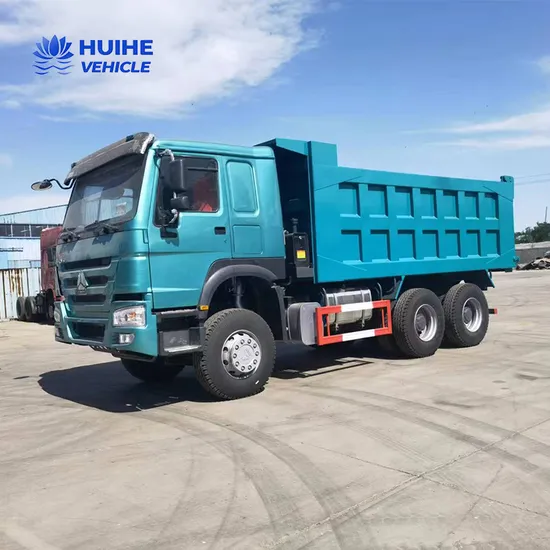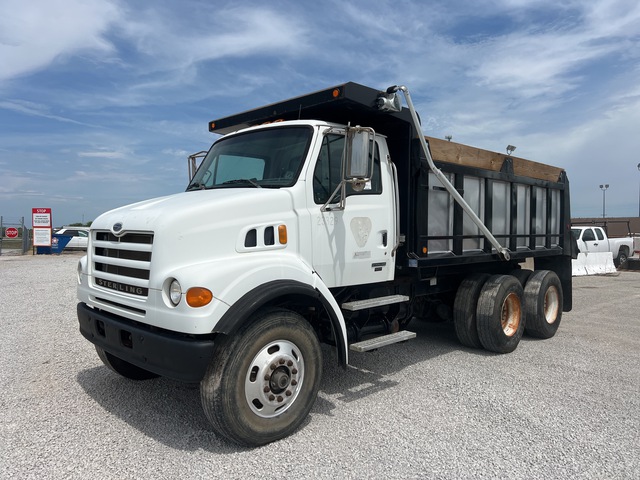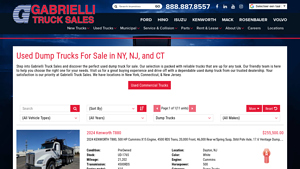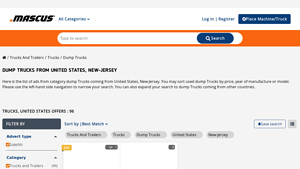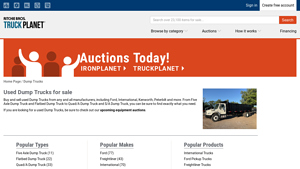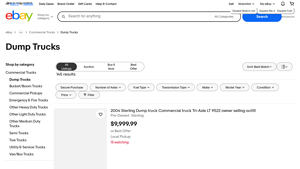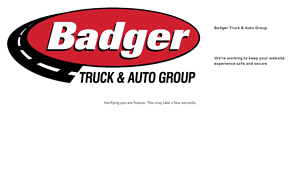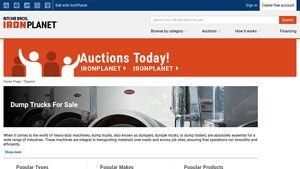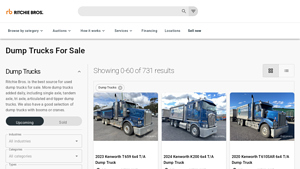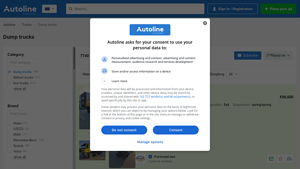Introduction: Navigating the Global Market for used Dump Truck Price
In the ever-evolving landscape of global construction and logistics, sourcing reliable used dump trucks at competitive prices presents a formidable challenge for international B2B buyers. Understanding the various factors that influence used dump truck prices is crucial for businesses looking to optimize their procurement strategies. This guide aims to equip buyers from regions such as Africa, South America, the Middle East, and Europe—including countries like Brazil and Nigeria—with the knowledge necessary to navigate the complexities of the used dump truck market.
Throughout this comprehensive resource, we will explore an array of topics, including the diverse types of dump trucks available, their specific applications, and critical supplier vetting processes. Furthermore, we will delve into the cost implications associated with various models and manufacturers, providing insights into how pricing can fluctuate based on market demand, truck condition, and regional factors.
By empowering B2B buyers with actionable insights and data-driven strategies, this guide serves as a valuable tool to facilitate informed purchasing decisions. Whether you are expanding your fleet or seeking to replace aging equipment, understanding the nuances of the used dump truck market will enable you to make strategic investments that align with your business objectives. With the right knowledge, you can confidently navigate this dynamic marketplace and secure the best value for your investment.
Understanding used Dump Truck Price Types and Variations
| Type Name | Key Distinguishing Features | Primary B2B Applications | Brief Pros & Cons for Buyers |
|---|---|---|---|
| Single Axle Dump Truck | Typically has a single rear axle; lower payload capacity. | Residential construction, landscaping. | Pros: Cost-effective, easier to maneuver. Cons: Limited capacity for larger loads. |
| Tandem Axle Dump Truck | Two rear axles provide increased payload capacity. | Medium to large construction projects. | Pros: Greater stability and load capacity. Cons: More expensive and less maneuverable than single axle. |
| Tri-Axle Dump Truck | Three rear axles for maximum load capacity and stability. | Heavy-duty construction, mining. | Pros: Ideal for heavy loads, improved traction. Cons: Higher maintenance costs, requires more space to maneuver. |
| Quad-Axle Dump Truck | Four rear axles; designed for the heaviest loads. | Large-scale construction, roadwork. | Pros: Exceptional load capacity, excellent stability. Cons: Very high purchase and operational costs. |
| Flatbed Dump Truck | Flatbed design allows for versatile loading options. | General transportation, landscaping. | Pros: Multi-functional, easy loading/unloading. Cons: Less secure for loose materials compared to traditional dump beds. |
What Are the Characteristics of Single Axle Dump Trucks?
Single axle dump trucks are designed for lighter loads, making them ideal for residential construction and landscaping projects. They typically feature a single rear axle, which allows for easier maneuverability in tight spaces. Buyers should consider the limited payload capacity, which can range between 5 to 10 tons, making them less suitable for larger construction sites but perfect for smaller jobs where agility is essential.
How Do Tandem Axle Dump Trucks Enhance B2B Operations?
Tandem axle dump trucks have two rear axles, providing a balanced load distribution and increased payload capacity, which typically ranges from 10 to 20 tons. They are well-suited for medium to large construction projects, where stability and load-bearing capabilities are critical. While they are more expensive than single axle models, their enhanced performance makes them a valuable investment for businesses that frequently handle substantial materials.
Why Choose Tri-Axle Dump Trucks for Heavy-Duty Tasks?
Tri-axle dump trucks are built for heavy-duty applications, offering three rear axles that enable them to carry loads of up to 25 tons or more. They are particularly effective in construction and mining sectors, where heavy materials are the norm. Although they come with higher maintenance costs and require more space to operate, their superior load capacity and traction make them indispensable for heavy-duty tasks.
What Makes Quad-Axle Dump Trucks Unique?
Quad-axle dump trucks are designed for the heaviest loads, with four rear axles that provide exceptional stability and load-bearing capabilities. These trucks are primarily used in large-scale construction and roadwork projects, where the ability to transport substantial quantities of material is crucial. However, their high purchase and operational costs may deter some buyers, making them more suitable for businesses with consistent heavy-load needs.
How Do Flatbed Dump Trucks Offer Versatility?
Flatbed dump trucks feature a flatbed design that allows for versatile loading and unloading options, making them suitable for various applications, including general transportation and landscaping. Their open design facilitates easy access for loading and unloading, but they may not secure loose materials as effectively as traditional dump beds. For businesses needing flexibility in transporting different types of materials, flatbed dump trucks can be a practical choice.
Key Industrial Applications of used Dump Truck Price
| Industry/Sector | Specific Application of used Dump Truck Price | Value/Benefit for the Business | Key Sourcing Considerations for this Application |
|---|---|---|---|
| Construction | Transporting aggregates and materials | Reduces transportation costs and improves project timelines | Assess vehicle condition and capacity to handle heavy loads |
| Mining | Hauling ore and waste material | Enhances operational efficiency in remote sites | Evaluate durability and maintenance history for harsh conditions |
| Agriculture | Moving soil and fertilizers | Optimizes land preparation and crop management | Consider bed size and compatibility with agricultural equipment |
| Waste Management | Collecting and disposing of waste | Improves waste collection efficiency and compliance | Ensure compliance with local regulations and environmental standards |
| Infrastructure Development | Delivering construction materials | Supports timely project execution and cost management | Analyze availability of parts and service support in local markets |
How is Used Dump Truck Price Applied in the Construction Sector?
In the construction industry, used dump trucks are essential for transporting aggregates, sand, and other materials to job sites. The price of these vehicles can significantly impact project budgets, making it crucial for businesses to source cost-effective options without compromising quality. Buyers should focus on the truck’s load capacity and overall condition, as well as any modifications that may be required for specific projects. This ensures that the trucks can efficiently handle the heavy loads and demanding environments typical of construction sites.
What Role Does Used Dump Truck Price Play in Mining Operations?
Mining operations rely heavily on dump trucks for hauling ore and waste material from extraction sites. The price of used dump trucks can provide significant savings, especially for companies operating in remote areas where new equipment may be cost-prohibitive. Buyers in this sector must consider the durability and maintenance history of the trucks, as they need to withstand harsh conditions and heavy usage. Additionally, sourcing trucks with a proven track record in mining applications can lead to improved operational efficiency and reduced downtime.
How is Used Dump Truck Price Relevant to Agriculture?
In agriculture, used dump trucks are utilized for moving soil, fertilizers, and other materials necessary for land preparation. The pricing of these vehicles can greatly affect the overall cost of farming operations, particularly for small to medium-sized farms in developing regions. Buyers should look for trucks that offer a balance between capacity and fuel efficiency. Compatibility with existing agricultural equipment is also a critical consideration to ensure seamless operations during planting and harvesting seasons.
Why is Used Dump Truck Price Important for Waste Management?
Waste management companies use dump trucks to collect and dispose of waste efficiently. The price of used dump trucks can help these businesses manage their operational costs while maintaining compliance with regulations. Buyers must consider the trucks’ suitability for waste collection, including features like hydraulic systems for lifting and unloading. Additionally, understanding local regulations regarding waste disposal and vehicle emissions is vital for ensuring compliance and avoiding potential fines.
How Does Used Dump Truck Price Impact Infrastructure Development?
In infrastructure development projects, used dump trucks play a crucial role in delivering construction materials. The cost-effectiveness of purchasing used vehicles can aid in keeping project budgets under control while ensuring timely delivery of materials. Buyers should assess the trucks’ reliability and availability of parts and service support in their regions, as this can impact long-term operational efficiency. Furthermore, understanding the specific requirements for different types of infrastructure projects, such as road construction or urban development, is essential for making informed purchasing decisions.
3 Common User Pain Points for ‘used Dump Truck Price’ & Their Solutions
Scenario 1: Navigating Price Fluctuations in Used Dump Trucks
The Problem: B2B buyers often encounter significant fluctuations in the prices of used dump trucks, making it challenging to budget effectively for purchases. Factors such as regional demand, seasonal variations, and economic conditions can all impact prices unpredictably. This uncertainty can lead to frustration when trying to secure the best deal, as buyers may end up paying more than anticipated or miss out on a good opportunity due to indecision.
The Solution: To navigate price fluctuations effectively, B2B buyers should leverage multiple sources of information to gain a comprehensive understanding of the market. Begin by monitoring online auction platforms, commercial truck trading websites, and local dealerships regularly. Establish a baseline price range by analyzing similar models and their historical sales data. Additionally, consider setting up alerts for specific trucks of interest to stay informed about new listings and price changes. This proactive approach will empower buyers to act quickly when a favorable price appears, ensuring they remain competitive in their procurement strategy.
Scenario 2: Understanding the True Cost of Ownership for Used Dump Trucks
The Problem: Many buyers focus solely on the initial purchase price of used dump trucks, neglecting to consider the total cost of ownership, which includes maintenance, repairs, fuel efficiency, and insurance. This oversight can lead to unforeseen expenses that significantly impact overall budgeting and operational efficiency. For instance, a lower-priced truck may require more frequent repairs, ultimately costing more over time than a slightly more expensive but more reliable model.
The Solution: To address this issue, B2B buyers should conduct a thorough cost analysis before making a purchase. This involves not only researching the upfront costs but also gathering data on the maintenance history, fuel efficiency ratings, and typical repair costs associated with the specific models they are considering. Engage with current owners through forums or networking events to gain insights into their experiences. Additionally, consider utilizing a total cost of ownership (TCO) calculator, which can provide a clearer picture of long-term financial implications. By understanding the full scope of costs associated with a used dump truck, buyers can make more informed decisions that align with their financial goals.
Scenario 3: Assessing Quality and Reliability of Used Dump Trucks
The Problem: Buyers often face the daunting task of assessing the quality and reliability of used dump trucks, especially when purchasing from unfamiliar dealers or auction sites. Without a thorough inspection or reliable history, buyers risk acquiring vehicles that may have hidden issues, leading to costly repairs and downtime. This uncertainty can create a significant barrier to making a purchase decision, as buyers weigh the risks versus the potential savings.
The Solution: To mitigate the risks associated with quality assessment, buyers should prioritize conducting comprehensive inspections and obtaining vehicle history reports for any used dump truck they consider. If possible, hire a trusted mechanic to evaluate the truck’s condition, focusing on critical components such as the engine, transmission, and hydraulic systems. Additionally, request service records to verify maintenance history and identify any recurring issues. Engaging with reputable dealers who offer warranties or guarantees can also provide an added layer of security. By ensuring thorough due diligence, buyers can confidently select a used dump truck that meets their operational needs without the worry of hidden defects.
Strategic Material Selection Guide for used Dump Truck Price
What Are the Key Materials Influencing Used Dump Truck Prices?
When considering the purchase of used dump trucks, the choice of materials used in their construction significantly impacts performance, durability, and ultimately, pricing. Here, we analyze four common materials: steel, aluminum, composite materials, and cast iron, focusing on their properties, advantages, disadvantages, and implications for international buyers.
How Does Steel Affect Used Dump Truck Pricing?
Steel is the most common material used in the construction of dump trucks, particularly for the chassis and bed. Its key properties include high tensile strength and excellent load-bearing capabilities, making it suitable for heavy-duty applications. Steel is also highly resistant to deformation under pressure, which is crucial for the demanding tasks that dump trucks face.
Pros: Steel is durable and cost-effective, offering a good balance between performance and price. It is also widely available, which simplifies sourcing and manufacturing.
Cons: However, steel is prone to corrosion, especially in humid or saline environments, which can lead to increased maintenance costs. Additionally, its weight can reduce fuel efficiency.
For international buyers, particularly in regions like Africa and South America, understanding local environmental conditions is critical. Buyers should consider protective coatings to mitigate corrosion, especially in coastal areas.
What Role Does Aluminum Play in Used Dump Truck Construction?
Aluminum is increasingly being used in dump truck construction, particularly for the bed. Its key properties include lightweight characteristics and excellent corrosion resistance, making it ideal for applications requiring reduced weight without sacrificing strength.
Pros: The reduced weight of aluminum can lead to improved fuel efficiency and increased payload capacity, directly impacting operational costs.
Cons: The primary disadvantage is the higher cost compared to steel, which can be a limiting factor for budget-conscious buyers. Additionally, aluminum may not be as durable under extreme conditions as steel.
International buyers should be aware of the varying standards for aluminum quality, such as ASTM specifications, and consider the specific needs of their operations, especially in regions with extreme weather conditions.
How Do Composite Materials Influence Dump Truck Pricing?
Composite materials, often used in specialized dump truck applications, combine various materials to enhance performance. These materials can offer high strength-to-weight ratios and excellent resistance to corrosion and impact.
Pros: Composites can significantly reduce the overall weight of the truck, improving fuel efficiency and payload capacity. They also require less maintenance due to their corrosion-resistant properties.
Cons: However, composites can be more expensive to manufacture and repair, which may deter some buyers. Their long-term performance in extreme conditions can also be less predictable compared to metals.
For international buyers, understanding the specific composite materials used and their compliance with local standards is essential. This is particularly important in regions with varying regulations on material safety and performance.
Why Is Cast Iron Still Relevant in Used Dump Trucks?
Cast iron is primarily used in the manufacturing of engine blocks and some heavy-duty components due to its excellent wear resistance and ability to withstand high temperatures.
Pros: Cast iron is incredibly durable and can handle heavy loads without deforming, making it suitable for high-performance applications.
Cons: The main disadvantage is its weight, which can negatively impact fuel efficiency. Additionally, cast iron is more brittle than steel, making it susceptible to cracking under extreme conditions.
For buyers in the Middle East and Europe, understanding the implications of using cast iron components in terms of maintenance and performance is crucial, especially in high-temperature environments.
Summary Table of Material Considerations
| Material | Typical Use Case for used Dump Truck Price | Key Advantage | Key Disadvantage/Limitation | Relative Cost (Low/Med/High) |
|---|---|---|---|---|
| Steel | Chassis and bed construction | Durable and cost-effective | Prone to corrosion | Medium |
| Aluminum | Dump truck beds | Lightweight and corrosion-resistant | Higher cost | High |
| Composite | Specialized applications | High strength-to-weight ratio | Expensive to manufacture and repair | High |
| Cast Iron | Engine blocks and heavy-duty components | Excellent durability | Heavy and brittle | Medium |
This analysis provides a comprehensive understanding of how material selection influences used dump truck pricing, equipping international buyers with the insights needed to make informed purchasing decisions.
In-depth Look: Manufacturing Processes and Quality Assurance for used Dump Truck Price
What Are the Key Manufacturing Processes for Used Dump Trucks?
Understanding the manufacturing processes behind used dump trucks is essential for B2B buyers looking to make informed purchasing decisions. The primary stages of manufacturing include material preparation, forming, assembly, and finishing. Each stage contributes to the durability, functionality, and overall quality of the dump truck.
Material Preparation: What Materials Are Used?
The manufacturing process begins with material preparation, where high-grade steel and aluminum are sourced for the truck’s frame and body. Quality materials are crucial as they directly influence the truck’s strength and longevity. Manufacturers often use advanced techniques such as laser cutting and CNC machining to ensure precision in material shaping. Additionally, suppliers may employ eco-friendly practices to align with international sustainability standards, which can be an important factor for buyers in regions focused on environmental responsibility.
How Is the Forming Process Conducted?
Once the materials are prepared, the forming process begins. This involves techniques such as stamping, bending, and welding to create the structural components of the dump truck. Modern manufacturers often utilize robotic arms for welding, ensuring consistent quality and reducing human error. This automation not only speeds up production but also enhances the overall safety of the manufacturing environment. Understanding these techniques allows B2B buyers to assess the potential reliability of the dump trucks they are considering.
What Happens During Assembly?
The assembly stage is where individual components come together to form the complete dump truck. This includes installing the engine, drivetrain, and hydraulic systems. Quality assurance checks are typically conducted at this stage to ensure that all components fit together correctly and function as intended. Manufacturers may also implement modular assembly practices, allowing for easier repairs and replacements, which can be a significant advantage for buyers looking for long-term investments.
How Is the Finishing Process Performed?
Finishing touches are applied in the final stage of manufacturing. This can involve painting, applying protective coatings, and installing any additional features such as dump beds or hydraulic systems. The finishing process is critical as it affects both the aesthetic appeal and the protective qualities of the truck. Buyers should look for manufacturers who use high-quality finishes, as these can significantly extend the life of the dump truck, especially in harsh operational environments.
What Quality Assurance Measures Are in Place for Used Dump Trucks?
Quality assurance (QA) is vital in ensuring that used dump trucks meet industry standards and customer expectations. B2B buyers should be aware of the various international standards and industry-specific certifications that apply.
Which International Standards Should Buyers Consider?
ISO 9001 is one of the most recognized international standards for quality management systems. Manufacturers adhering to this standard demonstrate a commitment to consistent quality in their products. Other relevant certifications may include CE marking for compliance with European health, safety, and environmental protection standards, and API certifications for specific components like engines and hydraulic systems. These certifications provide assurance that the dump trucks have undergone rigorous testing and meet established benchmarks.
What Are the Key Quality Control Checkpoints?
Quality control is typically segmented into several checkpoints: Incoming Quality Control (IQC), In-Process Quality Control (IPQC), and Final Quality Control (FQC).
-
IQC: This phase involves inspecting raw materials and components before they enter the manufacturing process. Ensuring that only high-quality materials are used is crucial for the overall durability of the dump truck.
-
IPQC: During this phase, manufacturers conduct inspections at various stages of production to identify and rectify any issues early on. This proactive approach helps minimize defects and ensures that assembly processes are followed correctly.
-
FQC: This final inspection occurs before the product is shipped to customers. It often includes functional testing and visual inspections to ensure that the dump truck meets all specifications and quality standards.
How Can B2B Buyers Verify Supplier Quality Control Processes?
For international buyers, especially those from regions like Africa, South America, the Middle East, and Europe, verifying the quality control processes of potential suppliers is crucial. Here are several strategies to ensure suppliers maintain high standards:
What Steps Can Buyers Take to Audit Suppliers?
Conducting audits of suppliers can provide insights into their manufacturing practices and quality assurance processes. Buyers can request detailed reports on quality control measures, including documentation of past audits and certifications. Additionally, on-site visits can help buyers assess the manufacturing environment and processes firsthand, allowing for better-informed decisions.
How Can Third-Party Inspections Enhance Confidence?
Engaging third-party inspection services can add an additional layer of assurance. These independent organizations can perform checks at various stages of the manufacturing process, ensuring compliance with international standards. Buyers should consider including third-party inspections as part of their procurement process, particularly for high-value purchases like dump trucks.
What Nuances Should International Buyers Be Aware Of?
International buyers should also be mindful of the nuances related to quality control and certification requirements in their regions. Different countries may have specific regulations that affect how products are manufactured and sold. Understanding these regulations can help buyers navigate potential challenges and ensure they are sourcing compliant and high-quality dump trucks.
Conclusion: What Should B2B Buyers Keep in Mind?
For B2B buyers looking to purchase used dump trucks, understanding the manufacturing processes and quality assurance practices is essential. By familiarizing themselves with the key stages of production and the relevant international standards, buyers can make informed decisions that align with their operational needs and quality expectations. Engaging in thorough supplier audits and considering third-party inspections will further enhance confidence in their procurement choices.
Practical Sourcing Guide: A Step-by-Step Checklist for ‘used Dump Truck Price’
Introduction
Navigating the used dump truck market can be challenging for B2B buyers, especially in diverse regions like Africa, South America, the Middle East, and Europe. This guide provides a practical checklist to help you source used dump trucks effectively, ensuring you secure the best price while meeting your operational needs.
Step 1: Define Your Technical Specifications
Before initiating the sourcing process, clearly outline your technical requirements for the dump truck. This includes capacity, type (e.g., tri-axle, flatbed), and any additional features such as hydraulic systems or dump body specifications. Defining these parameters will help you filter options and avoid unnecessary purchases.
- Capacity Requirements: Determine the payload capacity needed for your projects.
- Truck Type: Decide between various types, such as standard dump trucks or those with cranes.
Step 2: Research Market Prices
Understanding the market price for used dump trucks is crucial for making informed decisions. Use reputable online platforms, such as TruckPlanet or Commercial Truck Trader, to gather data on current listings and recent sales. This research will help you identify a reasonable price range for your desired specifications.
- Comparative Analysis: Look for similar models across different platforms to gauge average prices.
- Auction Insights: Pay attention to auction results to understand how competitive pricing can fluctuate.
Step 3: Evaluate Potential Suppliers
Selecting the right supplier is essential to ensure a smooth transaction and quality assurance. Vet potential suppliers by reviewing their company profiles, reading customer testimonials, and requesting references from previous buyers in your industry.
- Supplier Credentials: Check for certifications and industry affiliations that validate their credibility.
- Customer Feedback: Look for reviews that specifically mention the reliability of the trucks and after-sales service.
Step 4: Inspect the Dump Truck
Prior to finalizing any purchase, physically inspect the dump truck or arrange for a third-party inspection. This is vital to assess the vehicle’s condition, including the engine, transmission, and dump mechanism functionality.
- Key Areas to Inspect: Pay attention to signs of wear and tear, rust, or previous repairs.
- Documentation Check: Request maintenance records to understand the truck’s history.
Step 5: Negotiate the Price
Once you have gathered all necessary information, engage in price negotiations with the supplier. Use your market research data to justify your offer, and don’t hesitate to negotiate based on the truck’s condition and any repairs needed.
- Leverage Market Data: Present your findings from market research to support your negotiation stance.
- Consider Total Cost of Ownership: Factor in potential repair costs and maintenance when negotiating the final price.
Step 6: Finalize the Transaction
After agreeing on a price, ensure all contractual details are clear before signing any agreements. Verify that all terms related to warranty, delivery, and payment methods are explicitly stated to avoid future disputes.
- Contract Review: Have a legal professional review the agreement if necessary.
- Payment Security: Consider using secure payment methods or escrow services to safeguard your transaction.
Step 7: Plan for Logistics and Delivery
Once the purchase is confirmed, plan the logistics for transporting the dump truck to your location. Confirm delivery timelines with the supplier and ensure compliance with any import regulations if applicable.
- Transport Options: Evaluate shipping methods that best suit your budget and timeline.
- Import Regulations: Be aware of any tariffs or taxes that may apply when importing vehicles into your country.
By following this checklist, you can streamline the sourcing process for used dump trucks, ensuring you make informed decisions that align with your business needs.
Comprehensive Cost and Pricing Analysis for used Dump Truck Price Sourcing
What Are the Key Cost Components in Used Dump Truck Pricing?
When sourcing used dump trucks, understanding the cost structure is crucial for making informed purchasing decisions. The primary cost components include materials, labor, manufacturing overhead, tooling, quality control (QC), logistics, and profit margin.
- Materials: The quality and type of materials used in the construction of the dump truck significantly affect the price. Higher-grade steel or specialized components can lead to increased costs.
- Labor: Labor costs vary depending on the region and the complexity of the truck. Skilled labor for assembly and repair can inflate the price, especially in regions where labor is scarce.
- Manufacturing Overhead: This includes indirect costs associated with production, such as facility maintenance, utilities, and administrative expenses. A higher overhead can lead to higher prices for the end product.
- Tooling: The cost of tools and equipment necessary for the manufacturing process also factors into the overall pricing. If specialized tools are required, this can drive up costs.
- Quality Control: Ensuring that used dump trucks meet safety and performance standards incurs additional costs. Buyers should seek suppliers who invest in rigorous QC processes, as this can significantly impact the truck’s reliability.
- Logistics: Transportation costs to deliver the dump truck can vary widely based on distance and mode of transport. International buyers must also consider customs duties and import taxes.
- Margin: Finally, the profit margin set by the supplier can influence the final price. Understanding how much margin is typical for your supplier can provide leverage in negotiations.
How Do Price Influencers Affect Used Dump Truck Costs?
Several factors can influence the pricing of used dump trucks, particularly for international buyers:
- Volume/MOQ: Purchasing in bulk can lead to significant discounts. Suppliers often offer better pricing for larger orders due to reduced handling and logistics costs.
- Specifications/Customization: Custom specifications can increase costs. Buyers should evaluate whether they need specific features or if standard models will suffice.
- Materials: The choice of materials directly impacts durability and maintenance costs. Buyers should consider the long-term benefits of investing in higher-quality materials.
- Quality/Certifications: Trucks with certifications or warranties generally command higher prices but may offer better value in terms of performance and longevity.
- Supplier Factors: The supplier’s reputation, reliability, and geographic location can influence pricing. Established suppliers may charge a premium but often provide better service and quality assurance.
- Incoterms: Understanding the terms of delivery is essential. Incoterms dictate who bears the responsibility for shipping, insurance, and tariffs, directly affecting the total cost.
What Are the Best Buyer Tips for Sourcing Used Dump Trucks?
For international B2B buyers, particularly from regions like Africa, South America, the Middle East, and Europe, several strategies can enhance cost-efficiency:
- Negotiation: Leverage market knowledge and competitor pricing to negotiate better deals. Understanding the local market can give you an edge in discussions with suppliers.
- Total Cost of Ownership (TCO): Consider not just the purchase price but also maintenance, fuel efficiency, and resale value when evaluating the cost of a used dump truck. This comprehensive view can lead to better long-term investments.
- Pricing Nuances: Be aware of regional price variations due to demand, economic conditions, and currency fluctuations. Prices may be lower in certain markets, but shipping and import costs should be factored in.
- Research and Due Diligence: Before committing to a purchase, conduct thorough research on the truck’s history, performance, and previous ownership. This can help avoid costly surprises and ensure you are making a sound investment.
Disclaimer for Indicative Prices
The prices discussed in this analysis are indicative and can vary significantly based on market conditions, location, and specific truck features. Buyers are encouraged to conduct comprehensive market research and consult with suppliers for the most accurate and current pricing information.
Alternatives Analysis: Comparing used Dump Truck Price With Other Solutions
When evaluating the costs and benefits of purchasing used dump trucks, it is essential to consider alternative solutions that may fulfill similar operational needs. The choice of equipment can significantly impact the efficiency and profitability of construction and logistics operations. Below, we compare used dump trucks with two viable alternatives: renting equipment and utilizing specialized haulage services.
| Comparison Aspect | Used Dump Truck Price | Renting Equipment | Specialized Haulage Services |
|---|---|---|---|
| Performance | High load capacity and durability, ideal for construction sites. | Performance can vary; newer models often available, but limited by rental terms. | Flexible and can handle various types of loads with specialized equipment. |
| Cost | Initial investment can be substantial; however, long-term savings are possible. | Lower upfront costs; pay per use but can become expensive over time with frequent rentals. | Cost-effective for occasional use; pricing can vary based on load type and distance. |
| Ease of Implementation | Requires upfront purchase, licensing, and maintenance setup. | Quick setup; vehicles are readily available for short-term needs. | Minimal setup; the service provider handles logistics and equipment. |
| Maintenance | Ongoing maintenance costs and responsibilities fall on the owner. | Maintenance is the responsibility of the rental company. | No maintenance concerns for the buyer; handled by the service provider. |
| Best Use Case | Long-term projects requiring consistent use of heavy-duty trucks. | Short-term projects or seasonal work where equipment is only needed intermittently. | Projects with varied hauling needs, requiring flexibility and specialized services. |
What Are the Advantages and Disadvantages of Renting Equipment?
Renting equipment offers several advantages, particularly for businesses that may not require a dump truck on a continuous basis. The upfront costs are significantly lower, allowing companies to allocate capital elsewhere. Moreover, rental services often provide access to newer models equipped with the latest technology. However, the downsides include potential limitations in availability during peak seasons and the cumulative costs that can exceed the purchase price over time if equipment is rented frequently.
How Do Specialized Haulage Services Compare?
Specialized haulage services can be an attractive alternative for companies looking to avoid the complexities of equipment ownership. These services provide flexibility in terms of load types and can adapt to specific project needs without the overhead of maintenance and storage. The major disadvantage, however, is that reliance on external providers can lead to less control over scheduling and may incur higher costs for long-distance hauls or specialized requirements.
How Can B2B Buyers Choose the Right Solution?
For B2B buyers, the decision between purchasing a used dump truck, renting, or utilizing haulage services ultimately depends on their operational needs, budget constraints, and project timelines. Buyers should assess the frequency of use and the specific requirements of their projects. For long-term, heavy-duty applications, investing in a used dump truck may be the most cost-effective solution. Conversely, for short-term projects or variable needs, renting or engaging haulage services could provide the necessary flexibility without the burden of ownership. Conducting a thorough cost-benefit analysis can guide buyers to the solution that aligns best with their strategic goals.
Essential Technical Properties and Trade Terminology for used Dump Truck Price
What Are the Key Technical Properties to Consider When Evaluating Used Dump Truck Prices?
When assessing the price of used dump trucks, several technical specifications play a critical role in determining value and suitability for specific operations. Understanding these properties can help B2B buyers make informed decisions.
1. Payload Capacity
The payload capacity indicates the maximum weight a dump truck can carry. This is typically measured in pounds or tons. For construction and mining operations, knowing the payload capacity is crucial as it directly affects efficiency and operational costs. A truck with a higher payload capacity can complete jobs faster, reducing the need for multiple trips and saving time and fuel.
2. Gross Vehicle Weight Rating (GVWR)
GVWR is the maximum weight a vehicle is rated to safely carry, including its own weight plus the load. It is essential for compliance with local regulations and ensuring safety on the road. Understanding GVWR helps buyers select a dump truck that meets their specific regulatory requirements and operational needs, especially in regions with stringent weight limits.
3. Engine Power and Fuel Type
Engine specifications, including horsepower and torque, are critical for evaluating a dump truck’s performance. Additionally, the type of fuel—diesel or gasoline—can influence operational costs and maintenance. B2B buyers should consider the engine’s performance in relation to the intended use of the truck, as this affects both efficiency and longevity.
4. Transmission Type
Dump trucks typically come with automatic or manual transmission options. The type of transmission affects driving ease, maintenance, and fuel efficiency. Automatic transmissions can provide better fuel efficiency and ease of operation, particularly in urban environments with frequent stops. Buyers must evaluate their operational context to choose the most suitable option.
5. Body Material and Construction
The construction material of the dump body (e.g., steel, aluminum) impacts durability and weight. Steel bodies are generally more robust and better suited for heavy loads, while aluminum is lighter and can improve fuel efficiency. Understanding the trade-offs between different materials can help buyers choose a truck that balances strength with operational efficiency.
Which Trade Terminology Should B2B Buyers Understand When Purchasing Used Dump Trucks?
Familiarity with industry jargon is crucial for effective negotiation and purchase processes. Here are several key terms that every buyer should know.
1. OEM (Original Equipment Manufacturer)
This term refers to the company that originally manufactured the vehicle or its components. Understanding OEM parts is essential for ensuring compatibility and quality when sourcing replacement parts for maintenance.
2. MOQ (Minimum Order Quantity)
MOQ indicates the smallest quantity of a product that a supplier is willing to sell. For used dump trucks, knowing the MOQ helps buyers understand the scale of purchase necessary to engage with certain suppliers or auctions.
3. RFQ (Request for Quotation)
An RFQ is a document that a buyer sends to suppliers asking for price quotes on specified products. When buying used dump trucks, submitting an RFQ can help buyers gather competitive pricing and negotiate better deals.
4. Incoterms (International Commercial Terms)
These are international rules that define the responsibilities of buyers and sellers in international transactions. Familiarity with Incoterms is vital for understanding shipping costs, insurance, and liability, especially when purchasing trucks from abroad.
5. Tare Weight
Tare weight refers to the weight of the truck without any load. Knowing the tare weight is essential for calculating the payload capacity and ensuring that the truck can handle the required loads without exceeding GVWR.
By grasping these technical properties and trade terms, B2B buyers can navigate the used dump truck market more effectively, ensuring they make informed decisions that align with their operational requirements and budget constraints.
Navigating Market Dynamics and Sourcing Trends in the used Dump Truck Price Sector
What Are the Key Trends Influencing the Used Dump Truck Price Market?
The used dump truck market is currently shaped by a variety of global drivers and trends, particularly relevant for B2B buyers in regions like Africa, South America, the Middle East, and Europe. A key driver is the increasing demand for construction and infrastructure development, fueled by urbanization and economic growth in emerging markets such as Brazil and Nigeria. This demand has led to a surge in the need for reliable, cost-effective transportation solutions, making used dump trucks an attractive option for many businesses.
Technological advancements also play a crucial role in shaping sourcing trends. Online auction platforms and marketplaces have revolutionized how buyers access inventory, allowing for real-time bidding and greater transparency in pricing. Buyers can now leverage data analytics and market insights to make informed purchasing decisions, helping them negotiate better prices. Additionally, the rise of mobile technology means that buyers can easily monitor listings and auctions from anywhere, facilitating quicker decision-making.
Another notable trend is the increasing focus on fleet management solutions. Companies are adopting sophisticated telematics to track the performance and maintenance needs of their vehicles, which can help extend the lifespan of used dump trucks. This trend is particularly relevant for B2B buyers who aim to optimize their operational efficiency and reduce total cost of ownership.
How Is Sustainability Shaping the Sourcing of Used Dump Trucks?
Sustainability is becoming a critical consideration in the sourcing of used dump trucks, as businesses recognize the environmental impact of their procurement choices. The construction industry is one of the largest contributors to greenhouse gas emissions, and the push for greener practices is prompting buyers to consider the lifecycle of their vehicles. This trend is particularly significant in regions with stringent environmental regulations, such as Europe.
Ethical sourcing practices are gaining traction as B2B buyers seek to minimize their environmental footprint. Buyers are increasingly looking for suppliers who prioritize sustainable practices, such as using eco-friendly materials and ensuring proper disposal of end-of-life vehicles. Certifications like ISO 14001 for environmental management systems are becoming important indicators of a supplier’s commitment to sustainability.
Moreover, the demand for ‘green’ certifications is rising among used dump trucks. Buyers are showing interest in vehicles that have been retrofitted with cleaner technologies or alternative fuel options, which can significantly reduce emissions. As sustainability becomes integrated into procurement strategies, B2B buyers will need to assess not only the upfront costs but also the long-term environmental impact of their purchases.
What Is the Historical Context of the Used Dump Truck Market?
The evolution of the used dump truck market can be traced back several decades, reflecting broader changes in the construction and transportation industries. Initially, the market was characterized by limited options and a lack of transparency in pricing, making it challenging for buyers to find reliable vehicles at competitive prices. However, the advent of the internet and online marketplaces has transformed the landscape, providing buyers with access to a wider range of options and more information.
Over the years, the quality and durability of used dump trucks have improved significantly, driven by advancements in manufacturing and technology. Many manufacturers now offer extended warranties and certified pre-owned programs, enhancing buyer confidence in used vehicles. This evolution has not only increased the attractiveness of used dump trucks but has also contributed to a more dynamic and competitive market.
As we move forward, the focus on sustainability and ethical sourcing will likely continue to shape the trajectory of the used dump truck market, encouraging businesses to adopt more responsible procurement practices while meeting their operational needs.
Frequently Asked Questions (FAQs) for B2B Buyers of used Dump Truck Price
1. How do I determine the fair market value for a used dump truck?
To determine the fair market value of a used dump truck, research recent sales of similar models in your region. Utilize online marketplaces and auction sites to compare prices based on factors like age, mileage, condition, and brand. Additionally, consider consulting industry reports or appraisers specializing in heavy equipment to gain deeper insights into price trends. This will help you establish a baseline price and negotiate effectively with sellers.
2. What factors influence the price of used dump trucks?
The price of used dump trucks is influenced by several factors, including the truck’s age, mileage, brand reputation, and condition. Other aspects such as the type of dump truck (e.g., tri-axle vs. single-axle), any additional features or customizations, and regional demand can also affect pricing. Understanding these factors will help you identify a good deal and ensure you’re not overpaying for your investment.
3. What should I look for when inspecting a used dump truck?
When inspecting a used dump truck, pay close attention to the engine’s condition, transmission performance, and overall structural integrity. Check for signs of rust, wear, and any leaks. Assess the dump bed for functionality and damage, and review maintenance records to understand its service history. It’s also beneficial to have a trusted mechanic conduct a thorough inspection to uncover any hidden issues.
4. How can I vet suppliers of used dump trucks internationally?
To vet suppliers of used dump trucks, start by researching their reputation through online reviews and testimonials from previous clients. Verify their business credentials and certifications to ensure they comply with industry standards. It’s also wise to request references and possibly visit their facility if feasible. Establish clear communication and ask about their return policy, warranties, and after-sales support to gauge their reliability.
5. Are there minimum order quantities (MOQ) for purchasing used dump trucks?
Minimum order quantities (MOQ) for used dump trucks can vary significantly by supplier. Some dealers may allow individual purchases, while others might require you to buy in bulk to benefit from lower pricing. Always inquire about MOQ before negotiating, and consider the logistics of transporting multiple units if you’re looking to purchase more than one truck.
6. What payment terms should I expect when buying used dump trucks?
Payment terms for purchasing used dump trucks typically include options such as full upfront payment, financing, or installment plans. International transactions may also involve letters of credit or escrow services to protect both parties. Always clarify payment terms before finalizing any deal, and ensure that you receive a detailed invoice that outlines all costs involved, including shipping and taxes.
7. How do I handle logistics and shipping for used dump trucks purchased internationally?
Handling logistics and shipping for used dump trucks involves coordinating with freight forwarders who specialize in heavy equipment. Obtain quotes that include shipping, insurance, and any customs duties. Ensure that the seller provides all necessary documentation for export, and confirm that the truck complies with the import regulations of your destination country. Planning ahead will help streamline the shipping process and avoid delays.
8. What quality assurance measures should I take when purchasing used dump trucks?
To ensure quality assurance when purchasing used dump trucks, request detailed inspection reports and maintenance records from the seller. Consider obtaining a third-party inspection to validate the condition of the truck before purchase. Additionally, inquire about warranties or guarantees offered by the supplier, and ensure that you understand the return policy should the truck not meet your expectations upon arrival.
Important Disclaimer & Terms of Use
⚠️ Important Disclaimer
The information provided in this guide, including content regarding manufacturers, technical specifications, and market analysis, is for informational and educational purposes only. It does not constitute professional procurement advice, financial advice, or legal advice.
While we have made every effort to ensure the accuracy and timeliness of the information, we are not responsible for any errors, omissions, or outdated information. Market conditions, company details, and technical standards are subject to change.
B2B buyers must conduct their own independent and thorough due diligence before making any purchasing decisions. This includes contacting suppliers directly, verifying certifications, requesting samples, and seeking professional consultation. The risk of relying on any information in this guide is borne solely by the reader.
Top 8 Used Dump Truck Price Manufacturers & Suppliers List
1. Gabrielli – Used Dump Trucks
Domain: gabriellitruck.com
Registered: 1996 (29 years)
Introduction: Used Dump Trucks for Sale in NY, NJ, and CT. Key Features: 1. Engine Power: Optimized for heavy-duty operations. 2. Load Capacity: High-capacity dump bodies for efficient transport. 3. Durability: Reinforced frames and bodies for job site resilience. 4. Maintenance History: Well-documented service records. 5. Affordability: Competitive pricing for significant savings. 6. Versatility: Various model…
2. International – Dump Truck 7400 6X4
Domain: mascus.com
Registered: 2000 (25 years)
Introduction: This company, International – Dump Truck 7400 6X4, is a notable entity in the market. For specific product details, it is recommended to visit their website directly.
3. Dump Trucks – Buy & Sell Used Models
Domain: truckplanet.com
Registered: 2004 (21 years)
Introduction: This company, Dump Trucks – Buy & Sell Used Models, is a notable entity in the market. For specific product details, it is recommended to visit their website directly.
4. Dump Trucks – Various Makes and Models
Domain: ebay.com
Registered: 1995 (30 years)
Introduction: Dump Trucks for sale on eBay include various makes and models such as Ford, International, Chevrolet, Mack, GMC, and Kenworth. Key specifications include: Number of Axles (Single, Tandem, Tri), Fuel Type (Diesel, Gas), Transmission Type (Automatic, Manual), and Model Year ranging from 1999 to 2024. Prices vary widely, with listings under $25,000, between $25,000 to $54,900, and over $54,900. Featu…
5. Badger Truck – Dump Trucks
Domain: badgertruck.com
Registered: 1998 (27 years)
Introduction: Dump trucks cost between $15,000 and $200,000. Most models in inventory cost between $40,000 and $100,000. New dump trucks start at roughly $100,000 and can cost $150,000 or more, with Kenworth models starting around $180,000. Used dump trucks usually range from $30,000 to $40,000, with some as low as $15,000 and others up to $100,000. Smaller options like tandem axle setups or single axle dump tr…
6. IronPlanet – Dump Trucks: Key Buying Factors
Domain: ironplanet.com
Registered: 1999 (26 years)
Introduction: Dump trucks, also known as dumpers, dumper trucks, or dump trailers, are essential for transporting materials over roads and across job sites. They feature a cab and a hydraulic dump bed at the rear, allowing for the disposal of contents. Key factors to consider when buying a used dump truck include payload capacity (determined by gross vehicle weight rating – GVWR) and trailer bin size (measured …
7. Ritchie Bros. – Dump Trucks
Domain: rbauction.com
Registered: 1995 (30 years)
Introduction: New & Used Dump Trucks For Sale | Ritchie Bros. offers a variety of dump trucks including single axle, tandem axle, tri axle, articulated, and tipper dump trucks. They also have options with booms or cranes. Key manufacturers include Kenworth, Ford, International, Mack, and Peterbilt. Popular models include T800, T880, F-750, and F-550. The trucks are available in various locations across the Unit…
8. Used Dump Truck – 2019 Model, 28,700 kg Load Capacity
Domain: autoline.info
Introduction: {“type”:”Dump truck”,”condition”:”used”,”price”:”€90,000 (≈ $104,900)”,”year_of_manufacture”:2019,”mileage”:”158,855 km”,”load_capacity”:”28,700 kg”,”volume”:”20 m³”,”axle_configuration”:”8×4″,”suspension”:”spring/spring”,”way_of_unloading”:”rear”,”location”:”Serbia, Novi Sad”,”seller”:”Put-invest doo”}
Strategic Sourcing Conclusion and Outlook for used Dump Truck Price
In navigating the complex landscape of used dump truck pricing, strategic sourcing emerges as an essential tool for B2B buyers. Understanding the various factors influencing prices—from truck make and model to condition and market demand—enables buyers to make informed decisions that align with their operational needs and budgetary constraints. Key insights reveal that auction platforms and direct sales offer varying opportunities for savings, especially for those looking to procure quality vehicles at competitive prices.
As international buyers from regions such as Africa, South America, the Middle East, and Europe explore their options, the importance of establishing relationships with reputable sellers cannot be overstated. Engaging with trusted sources and leveraging online marketplaces can yield significant advantages in terms of pricing transparency and availability.
Looking ahead, the demand for used dump trucks is expected to remain robust, driven by infrastructure development and construction projects worldwide. By prioritizing strategic sourcing practices and staying informed about market trends, buyers can position themselves for success. Take action today by exploring available listings and connecting with suppliers who understand your unique market needs, ensuring you secure the best value for your investment.

